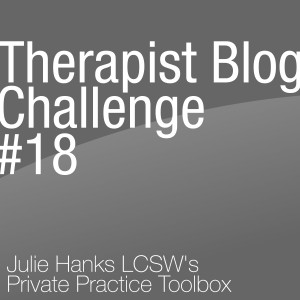Therapist blog challenge #18 deals with how to have a disagreement with a loved one while still preserving your relationship.
[Headline] Come up with a catchy title for your blog post. Here are a few examples:
Debating with Dignity: How to Disagree and Still Be Friends
Maintaining Relationships When You Having Different Opinions
Agree to Disagree: Respectfully Holding Differing Views
[Strong Intro] Lay out the topic with a little more detail in an opening paragraph. Below is an example:
There's no shortage of controversial issues in our world. Politics, religion, social issues, and even personal tastes in music and art can cause conflict in our interactions with others. But what happens when you disagree about certain topics with a romantic partner, family member, or close friend? Can you maintain your views without sabotaging your relationship? Yes! Here are 5 strategies to disagreeing on certain issues while still maintaining a strong connection with your loved one:
[Scanable Content] Break your content into smaller, readable sections with a clear sub-heading.
Is It Worth It?
Before engaging in a (heated) debate, ask yourself if the discussion is valuable enough to have. If you feel strongly about a particular subject, then maybe it is worth it to express yourself and make sure you are heard. But if it's a topic that doesn't resonate personally or is otherwise irrelevant, it's probably not a good idea to risk putting a strain on your relationship. A common saying is that, "you don't have to attend every argument you're invited to." Additionally, be conscious of your environment. A workplace or family gathering is not the place to have a heated debate. If you feel you must discuss something controversial, make sure you have a private setting in which to do so.
Practice Respect
If you do decide to freely discuss something about which you disagree, respect is crucial. Always, always avoiding name-calling and yelling. No argument is worth that. Being respectful with your words and body language can not only preserve your relationship, but can also facilitate the conversation and make it more productive. The famous actress/ comedian Amy Poehler has said, "If you can speak about what you care about to someone you disagree with, you just may be heard."
Find Common Ground
Take a moment to find things you do agree upon. For example, perhaps you are discussing a current health issue. It's a good idea to acknowledge not only your differing opinions, but also to state that you both want a solution that will benefit society. Finding common ground can help you relate to one another. You don't necessarily have to surrender your viewpoint, but try to reach some level of consensus.
Check Your Pride
It's not uncommon for conversations about controversial subjects to devolve into power-struggles. Make sure you are expressing your beliefs instead of exercising your pride. Avoid engaging in debate simply to satisfy your ego, as this can lead to things escalating out of control. Don't allow your desire to be right become more important than your relationship.
Take a Break
Discussions about the hot button issues have a way of dragging on forever. Those involved often go around in circles, and at some point, the conversation is no longer productive. If you find yourself hearing or repeating the same arguments, or if things become too heated, take a break. Better yet, end the conversation altogether! While you don't necessarily need to avoid disagreement altogether, you have to know when to stop.
[Strong ending paragraph] The final paragraph wraps up your post and can include a summary of important points.
Disagreeing on tough issues can be done in a loving, productive way. Not every debate needs to end with one person converting to the other's point of view; and that's okay (especially in relationships)! By using respectful language, keeping your pride and emotions in check, and stopping if things get too intense, you can successfully agree to disagree.
Additional reminders about the Therapist Blog Challenge:
- Write and post your blog article in the next 2 weeks. If you miss the deadline or you read this article months later, that’s OK too. Post a link for this blog challenge in the comment section of this blog post.
- Read, comment, and share other therapist’s articles.
- Tweet your post using hashtag #therapistblog and tag @julie_hanks so I can retweet it.
- Pin it on the challenge Pinterest Board. I’ve invited everyone who posted a comment on the initial blog challenge post as collaborators so you can pin onto the group board.
- Spread the word and invite mental health colleagues to join the challenge. Articles can be added anytime throughout the year.
- Write no more than 600 words, make it easy to read, use a conversational tone, and gear your articles toward your ideal client (not other professionals).
- The goal of a professional blog is to provide value to your website visitors, help them get to know your professional perspective, increase traffic to your private practice website, and build your practice.
Join my Private Practice Toolbox Facebook group and connect with 3000 therapists around the globe in 2 simple steps: 1) Click request to join the group and 2) Fill out this brief questionnaire before you'll be added to the group.Get practice tips and blog updates in your inbox.


As healers, we genuinely like to do our work. Guiding clients through the therapy process and seeing them make progress is why we do what we do. But if you're in private practice, you know there's a lot going on in the back end and that it's crucial to run an efficient and organized business.